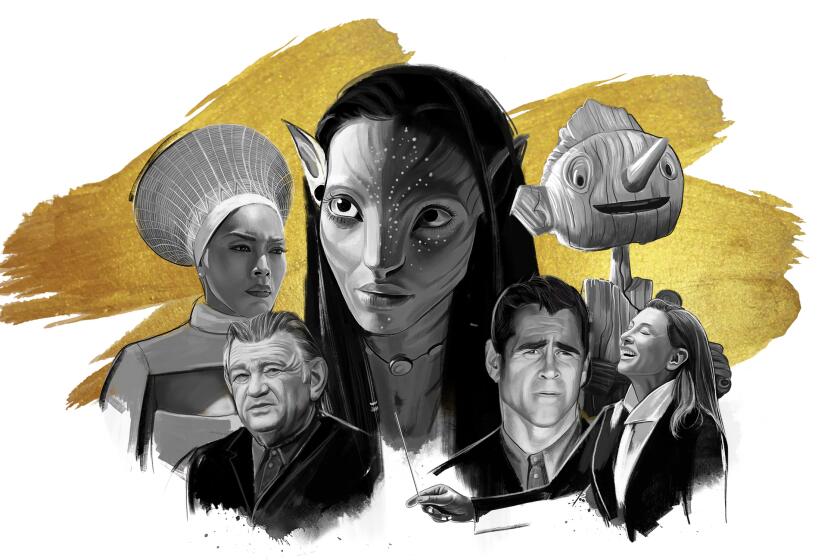How to watch every best picture winner from 2000 through 2009

- Share via
Ron Howard picked up his first directing Oscar for best picture “A Beautiful Mind.” Also winning best picture and director Oscars were Peter Jackson (“The Lord of the Rings: The Return of the King,” 2003); Martin Scorsese (“The Departed,” 2006); Joel Coen and Ethan Coen (“No Country for Old Men,” 2007); Danny Boyle (“Slumdog Millionaire,” 2008) and Kathryn Bigelow (“The Hurt Locker,” 2009).
Also, “Chicago” (2002) was the first musical to win best picture since “Oliver!” (1968).
How to watch Oscar Best Picture winners through the decades
Intro and 1920s | 1930s | 1940s | 1950s | 1960s | 1970s | 1980s | 1990s | 2000s | 2010s | 2020s (and 2020 nominees)
2000: ‘Gladiator’
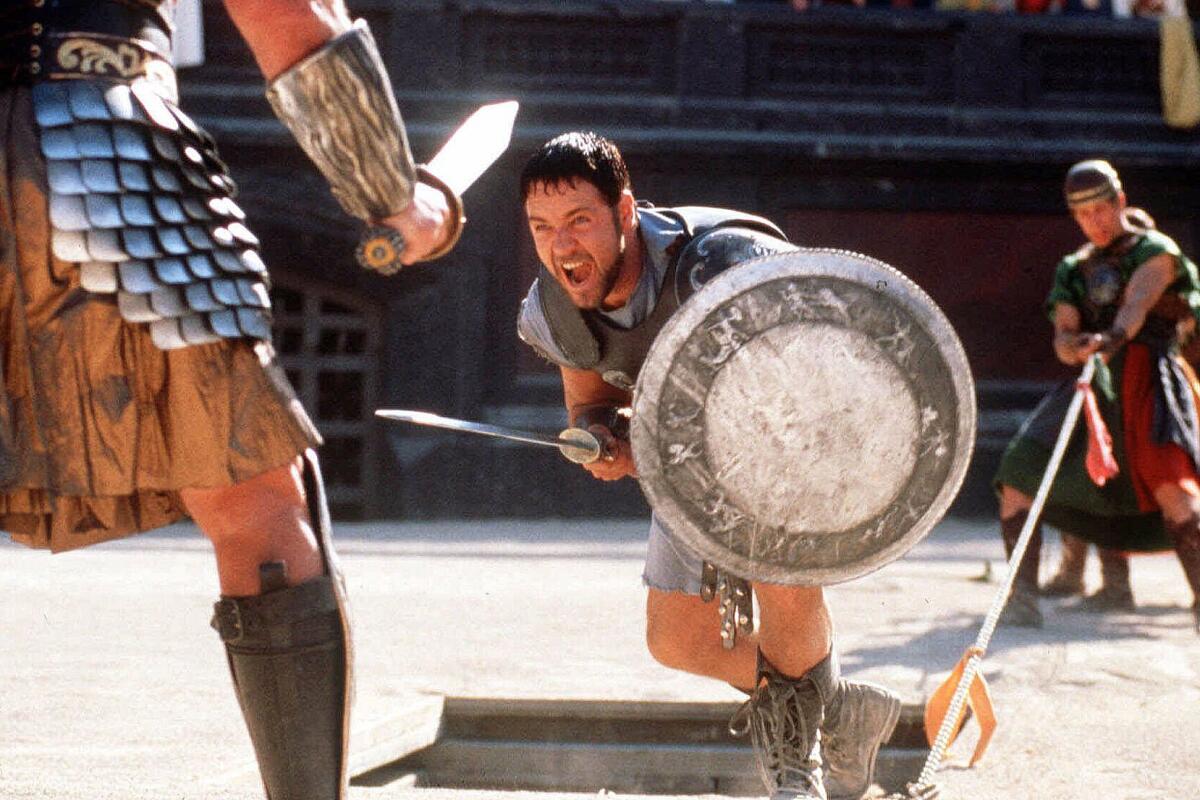
73rd Academy Awards — March 2001
Rated: R, for intense graphic combat.
Times guidelines: A lot of bloodletting, but most of it happens so quickly that the impact is diminished.
Running time: 2 hours, 30 minutes
Streaming: Prime Video: Rent/Buy | Apple TV+: Rent/Buy
“Gladiator” delivers when it counts — but then and only then. Like an aging athlete who knows how to husband strength and camouflage weaknesses, it makes the most of what it does well and hopes you won’t notice its limitations. With someone like Russell Crowe in the starring role, it doesn’t have much to worry about.
An intensely masculine actor with the ability to be as thoroughly convincing in a tailored suit (“The Insider”) as in a suit of armor here, Crowe has a patent on heroic plausibility. Whether it’s as commanding general Maximus, adored by the armed multitudes, or a friendless man fighting for his life in a “When Bad Things Happen to Good People” plot, Crowe brings essential physical and psychological reality to the role. Even Spartacus himself might want to echo Billy Crystal’s Oscar night wail of “I am so not Spartacus” after seeing what Crowe is up to here.
If Crowe is well suited to be this film’s star, the same can be said for Ridley Scott as its director. From “The Duelists,” his 1977 debut, through classics like “Alien” and “Blade Runner,” Scott has demonstrated a wonderful gift for ambience, for making out-of-the-ordinary worlds come alive on screen. (Read more) — Kenneth Turan
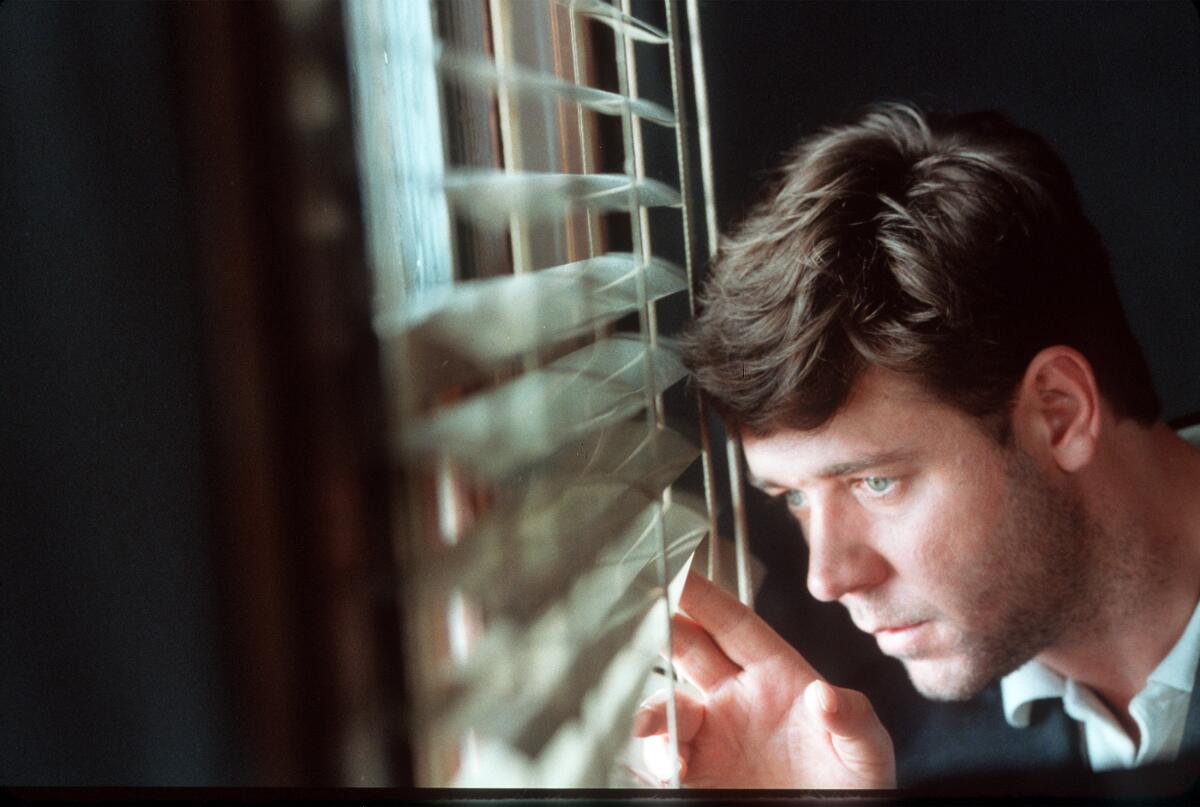
Here are the nominees for the 2023 Academy Awards in all categories, announced live Tuesday from the Samuel Goldwyn Theatre in Beverly Hills.
2001: ‘A Beautiful Mind’
74th Academy Awards — March 2002
Rated: PG-13, for intense thematic material, sexual content and a scene of violence.
Times guidelines: May be too disturbing for younger audiences.
Running time: 2 hours, 9 minutes
Streaming: Hulu: Included | Prime Video: Rent/Buy | Apple TV+: Rent/Buy
Recoveries from affliction, life-affirming triumphs of the human spirit, are catnip for Hollywood, and few stories fit that model as cozily as the life of mathematician John Forbes Nash Jr.
As detailed in the Sylvia Nasar biography that gives “A Beautiful Mind” its title, Nash was a brilliant mathematician, a handsome solver of impossible problems who was one of his generation’s towering theoretical figures.
Then began a catastrophic 30-year interlude of intense paranoid schizophrenia that ended, even more astonishingly, with a remission that was capped by a share of the 1994 Nobel Prize in economics.
Although it would be satisfying to report that “A Beautiful Mind,” which stars Russell Crowe as the mathematician and Jennifer Connelly in a career-best performance as his beleaguered wife, also beat the Hollywood odds and is a potent treatment of a serious, adult theme, the reality is not that clear-cut.
There is more to admire in “A Beautiful Mind” than you might suspect, but less than its creators believe. When the film does succeed, it almost seems to do so despite itself, at those moments when the power of the underlying story structure and the strength of the actors overcome the film’s inevitable weakness for hitting things too much on the nose. (Read more) — Kenneth Turan
2002: ‘Chicago’
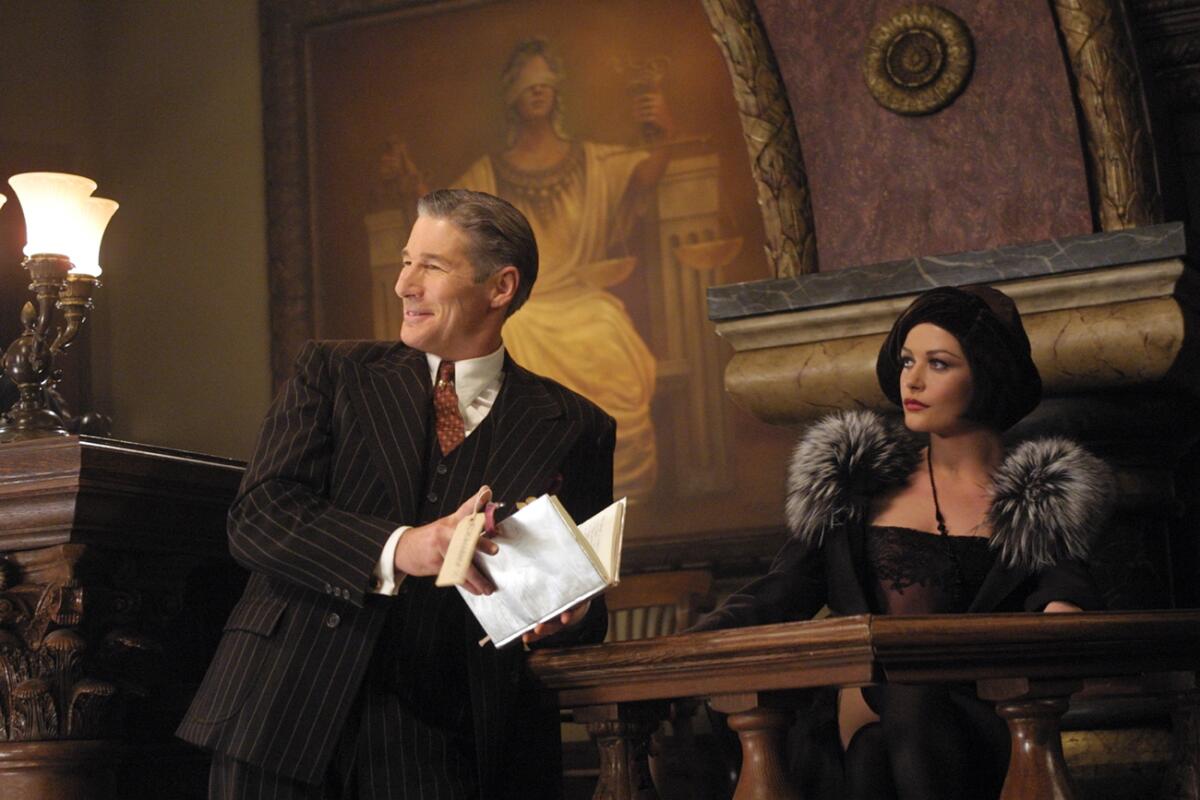
75th Academy Awards — March 2003
Rated: PG-13, for sexual content and dialogue, violence and thematic elements.
Times guidelines: Some (not enough) suggestive dancing and songs. Nobody is remotely sorry for his or her bad behavior.
Running time: 1 hour, 53 minutes
Streaming: HBO: Included | Prime Video: Rent/Buy | Apple TV+:Rent/Buy
Ever since she landed in Hollywood a couple years back, the Welsh-born actress Catherine Zeta-Jones has been playing the part of an old-fashioned star with a vengeance. She made a splash in silly (but lucrative) entertainments like “The Mask of Zorro” and “Entrapment” in which she confidently flaunted her lush physicality, only to turn around and flex her acting chops with a supporting role in Steven Soderbergh’s “Traffic.” Few moments in that film were as shocking as the image of the then-hugely pregnant actress seated behind the wheel of a luxury SUV screaming obscenities into a cell phone at her personal contract killer. Here was a star who really acted like one.
In “Chicago,” Rob Marshall’s film version of the 1975 musical first staged by Bob Fosse, Catherine Zeta-Jones plays a different kind of beautiful monster, Velma Kelley, a former habitue of the Chicago stage now appearing in prison. The time is 1929, a time of bootleggers and Tommy guns, and Velma has, as they used to say, done her man wrong. (Her sister, too, whom she discovered en flagrante with the deceased.) As far as Velma and her lawyer, Billy Flynn (Richard Gere), are concerned, however, jail is just another public relations opportunity. On stage, the showgirl had to share the limelight with her sister, but whether she’s putting in face time with Billy at the courtroom or granting interviews from behind bars, Velma now receives top billing. She’s a Chicago star, like Al Capone.
A star on the fade, alas. Velma isn’t really the main attraction in this iteration of the musical, which centers far more on the trials of Roxie Hart (Renee Zellweger), a would-be chorine who shoots her lover (Dominic West) and begs her husband (John C. Reilly) to take the rap. He does and then he doesn’t, which is how Roxie lands on the same prison block with her vaudeville idol, Velma. Aided by Matron Mama Morton (an underused Queen Latifah), Roxie follows Velma’s lead, hires Billy Flynn and with his assistance transforms into Chicago’s newest tabloid sensation. As far as Roxie is concerned, murderesses row isn’t much different from tryouts in the sticks. If you’re not killed, you may hit the big time. (Read more) — Manohla Dargis
2003: ‘The Lord of the Rings: The Return of the King’
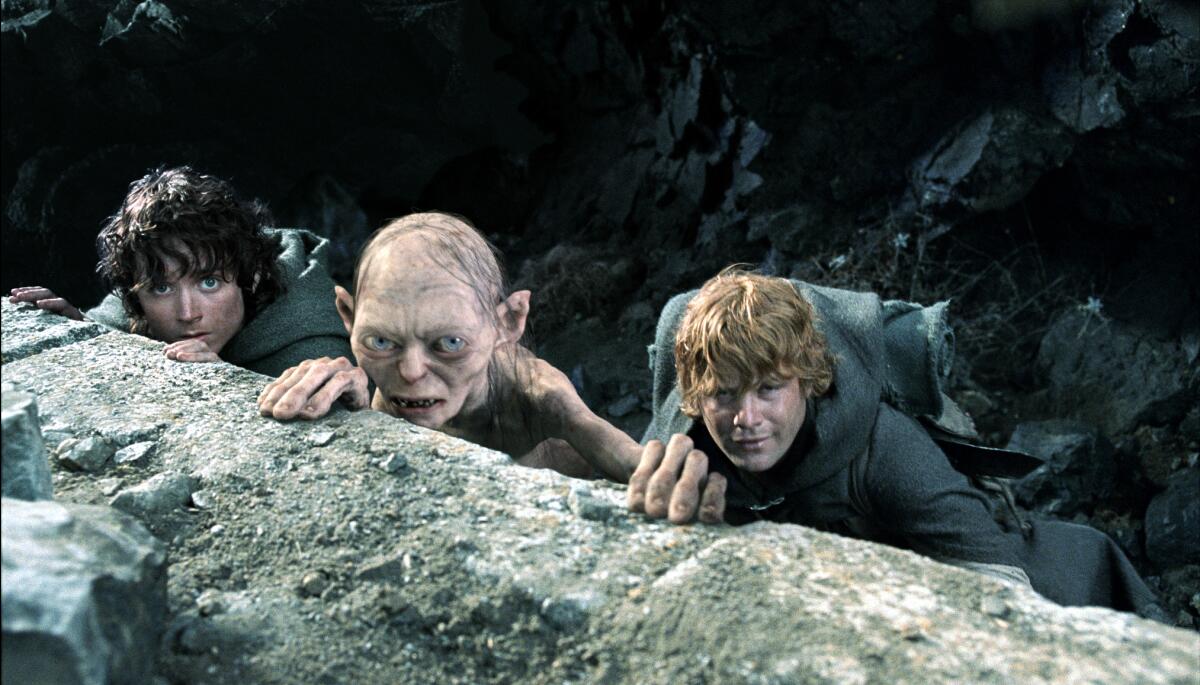
76th Academy Awards — February 2004
Rated: PG-13, for intense epic battle sequences and frightening images.
Times guidelines: A monstrous spider is easily the most frightening element in any of the three films.
Running time: 3 hour, 20 minutes
Streaming: HBO Max: Included | Prime Video: Rent/Buy | Apple TV+: Rent/Buy
It took one ring to rule them all, and now there’s one film to end it all, to bring to a close the cinematic epic of our time, the one by which all others will be judged. “The Lord of the Rings: The Return of the King” has finally arrived.
Powerfully imagined two times over, first by the matchless fantasy mind of J.R.R. Tolkien and then by the bravura filmmaking of director Peter Jackson and a cast and crew that reached 2,400 souls, “The Return of the King” is a fitting climax to a story about the quest to rescue the world from evil that has had us profoundly in its grip from the start. (Read more) — Kenneth Turan
2004: ‘Million Dollar Baby’
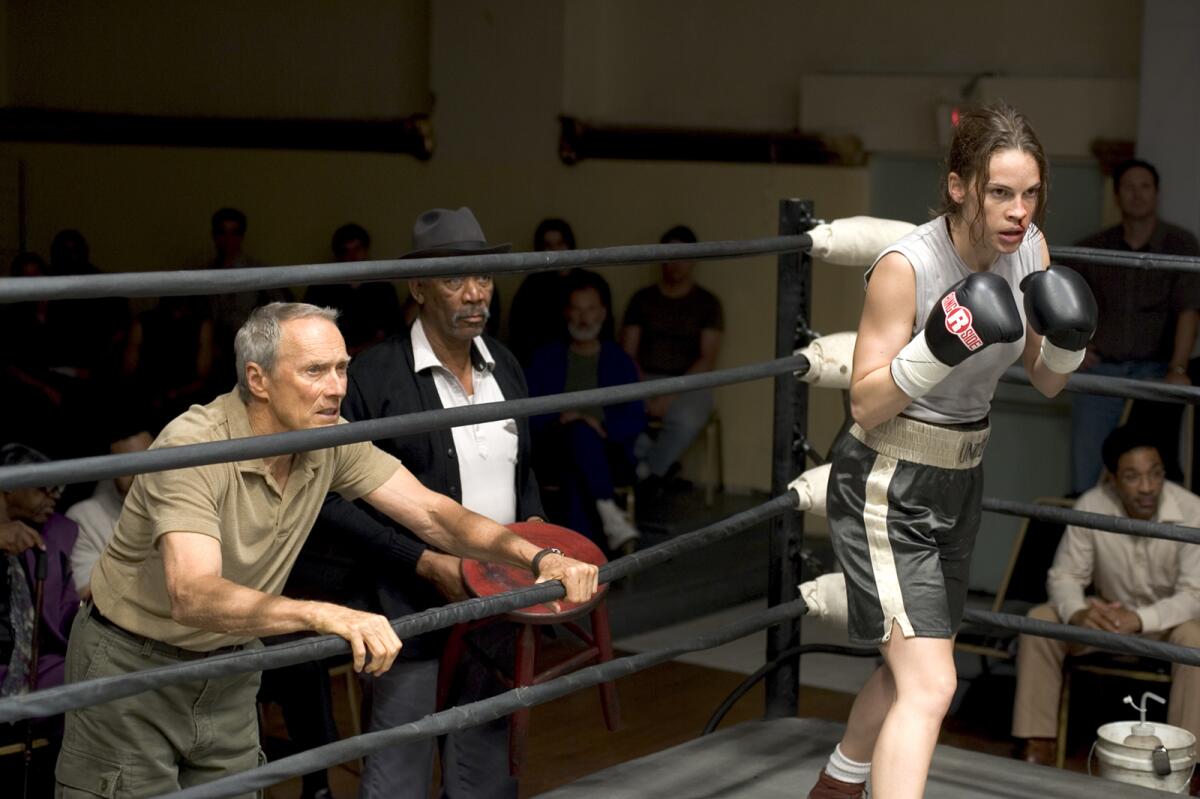
77th Academy Awards — February 2005
Rated: PG-13, for violence, some disturbing images, thematic material and language.
Times guidelines: Considerable boxing violence, unsettling adult subject matter and situations.
Running time: 2 hour, 12 minutes
Streaming: Prime Video: Rent/Buy | Apple TV+: Rent/Buy
What can be said about Clint Eastwood that hasn’t been said before?
That he’s American film’s last and best classicist, a 74-year-old director who’s aged better than a “Sideways” Pinot Noir? That his increasingly fearless and idiosyncratic choice of material has made him more of an independent filmmaker than half the people at Sundance? That he continues to find ways to surprise audiences yet remain inescapably himself? It’s all true, and never more so than in Eastwood’s latest, “Million Dollar Baby.”
Perhaps the director’s most touching, most elegiac work yet, “Million Dollar Baby” is a film that does both the expected and the unexpected, that has the nerve and the will to be as pitiless as it is sentimental. A tale of the power and cost of dreams set in the unforgiving world of professional boxing, it’s got some of the emotional daring of the great melodramas of Hollywood’s golden age, when films considered it a badge of honor to wear their heart on their sleeve.
“Million Dollar Baby” also reconfirms what “Mystic River” and its Oscars for Sean Penn and Tim Robbins made clear: that Eastwood, despite his legendary no-nonsense style, has become a gifted director of actors. It’s not just the exceptional work by costars Hilary Swank and Morgan Freeman that stands out here, it’s Eastwood’s own performance, in some ways the most nakedly emotional of his 50-year career. (Read more) — Kenneth Turan
2005: ‘Crash’
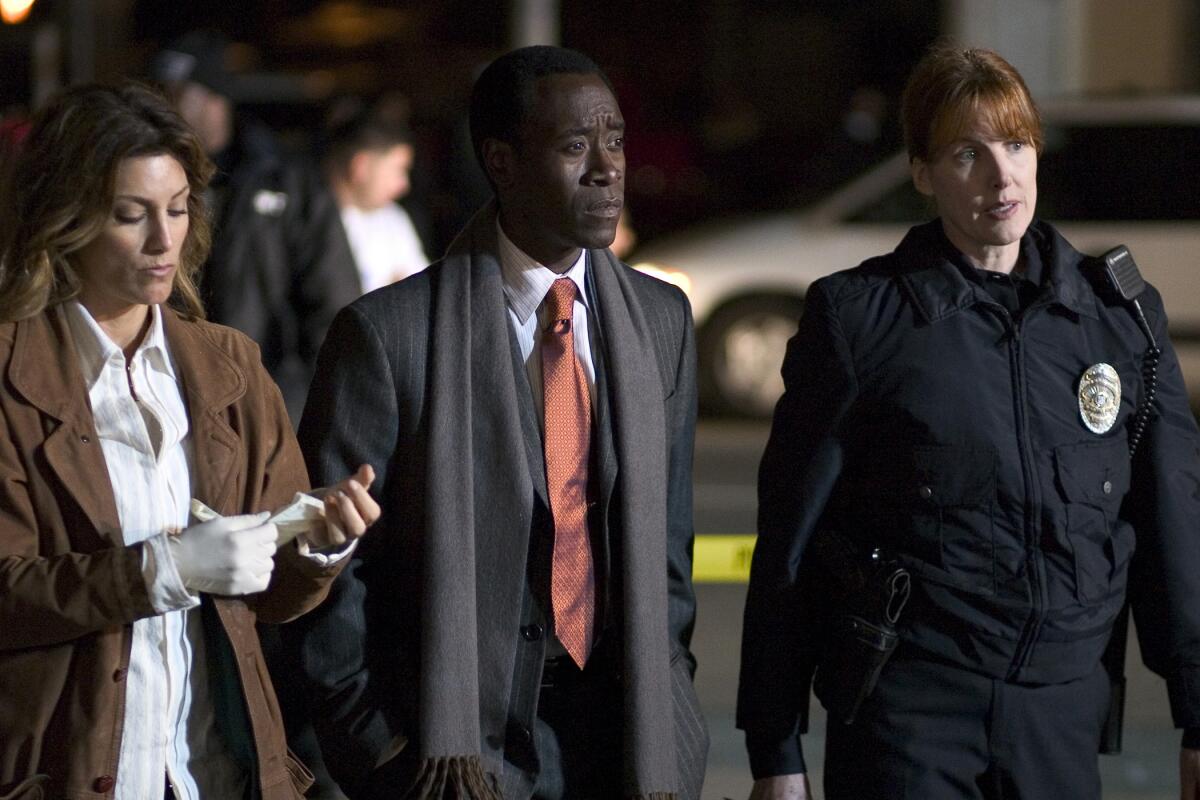
78th Academy Awards — March 2006
Rated: R, for language, sexual content and some violence.
Times guidelines: Crude as the language is, it pales next to the noxious message.
Running time: 1 hour, 52 minutes
Streaming: HBO Max: Included | Apple TV+: Rent/Buy
I’m not sure the best way to kick off a movie that wants to expose the dark heart of the true Los Angeles is to contrast it with “real cities” where “people walk, you brush past people, people bump into you,” but that’s what writer-director Paul Haggis does in the first few moments of “Crash,” a grim, histrionic experiment in vehicular metaphor slaughter.
Graham Waters (Don Cheadle) and Ria (Jennifer Esposito), two detectives in love, are rear-ended on their way to a murder scene, and no sooner has the dazed Graham delivered his soliloquy on urban alienation (“I think we miss that sense of touch so much, we crash into each other just to feel something”) Ria and the other driver, a middle-aged Korean woman, start loudly trading racial slurs without even a four-letter preamble. So much for the urban brotherhood of man: In “Crash,” there’s no getting through a fender bender, casual conversation, business transaction, phone call to mom or naked love romp without someone’s ancestry taking a nasty beating. (Read more) — Carina Chocano
2006: ‘The Departed’
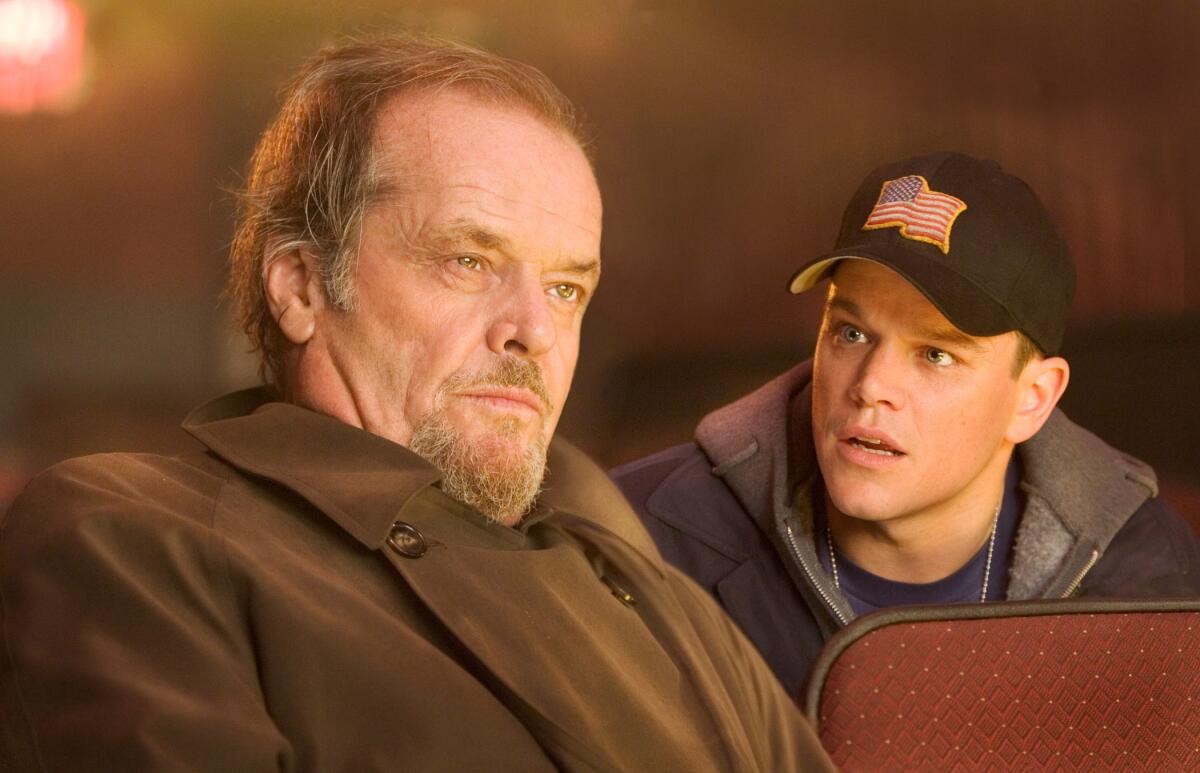
79th Academy Awards — February 2007
Rated: R, for strong brutal violence, pervasive language, some strong sexual content and drug material.
Running time: 2 hours, 31 minutes
Streaming: HBO Max: Included | Netflix: Included | Prime Video: Rent/Buy | Apple TV+: Rent/Buy
Frequently excessive but never dull, “The Departed” is a little too much of a lot of the things that define Martin Scorsese films but it’s also almost impossible to resist. Too operatic at times, too in love with violence and macho posturing at others, it’s a potboiler dressed up in upscale designer clothes, but oh how that pot does boil.
The key to the success of “The Departed’s” cops-and-robbers tale of connivance, duplicity and deception is a crackerjack premise that comes courtesy of Hong Kong’s 2002 “Infernal Affairs.” Written by Alan Mak and Felix Chong, that film was a monster hit both at home and throughout Asia that spawned two sequels and was acquired by Miramax but never released theatrically in Los Angeles.
The idea is that in the midst of a war between the police and organized crime, each side succeeds in placing a clever mole in the heart of the other camp. Gradually, each spy discovers the existence — but not the identity — of his opposite and, as the noose tightens and the tension ratchets past the cracking point, each man struggles furiously to unmask his rival before he himself is revealed and destroyed. (Read more) — Kenneth Turan
2007: ‘No Country for Old Men’
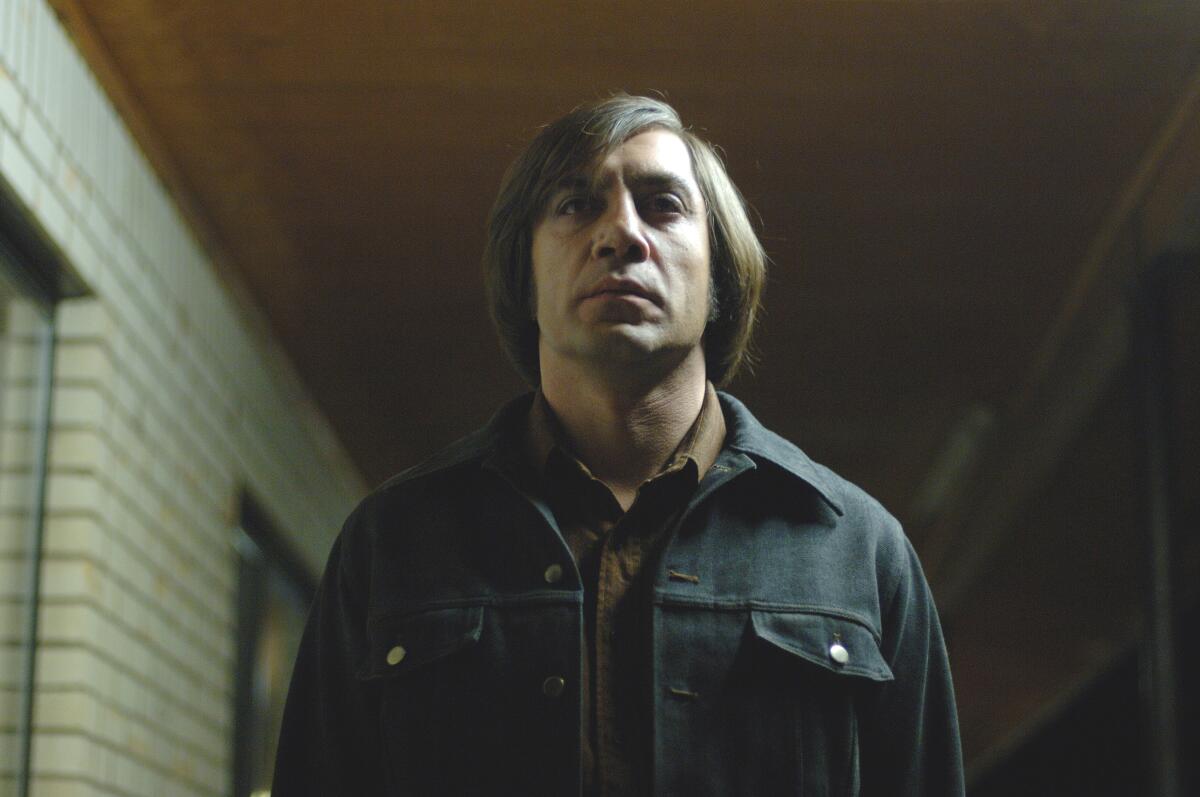
80th Academy Awards — February 2008
Rated: R, for strong graphic violence and some language.
Running time: 2 hours, 2 minutes
Streaming: HBO Max: Included | Hulu: Included | Prime Video: Rent/Buy | Apple TV+: Rent/Buy
With “No Country for Old Men,” the Coen brothers drop the mask. They’ve put violence on screen before, lots of it, but not like this. Not anything like this.
The story of stolen drug money and the horrific carnage it precipitates, “No Country for Old Men” doesn’t celebrate or smile at violence, it despairs of it, despairs of its randomness, pervasiveness, its inescapable nature, of the way it eats at the soul of society and the individuals in it.
An intense, nihilistic thriller as well as a model of implacable storytelling, this is a film you can’t stop watching even though you very much wish you could. That’s because “No Country” escorts you through a world so pitilessly bleak, “you put your soul at hazard,” as one character says, to be part of it.
That would be Sheriff Ed Tom Bell, a third-generation West Texas lawman who has to worry about Llewelyn Moss, a local man who absconded with $2.4 million in drug cash, and Anton Chigurh, a psychotic killing machine with a peculiar moral compass that’s as hard to decipher as his accent. Or his haircut. With Tommy Lee Jones, Josh Brolin and Javier Bardem doing the honors, respectively, this is definitely acting to write home about. (Read more) — Kenneth Turan
2008: ‘Slumdog Millionaire’
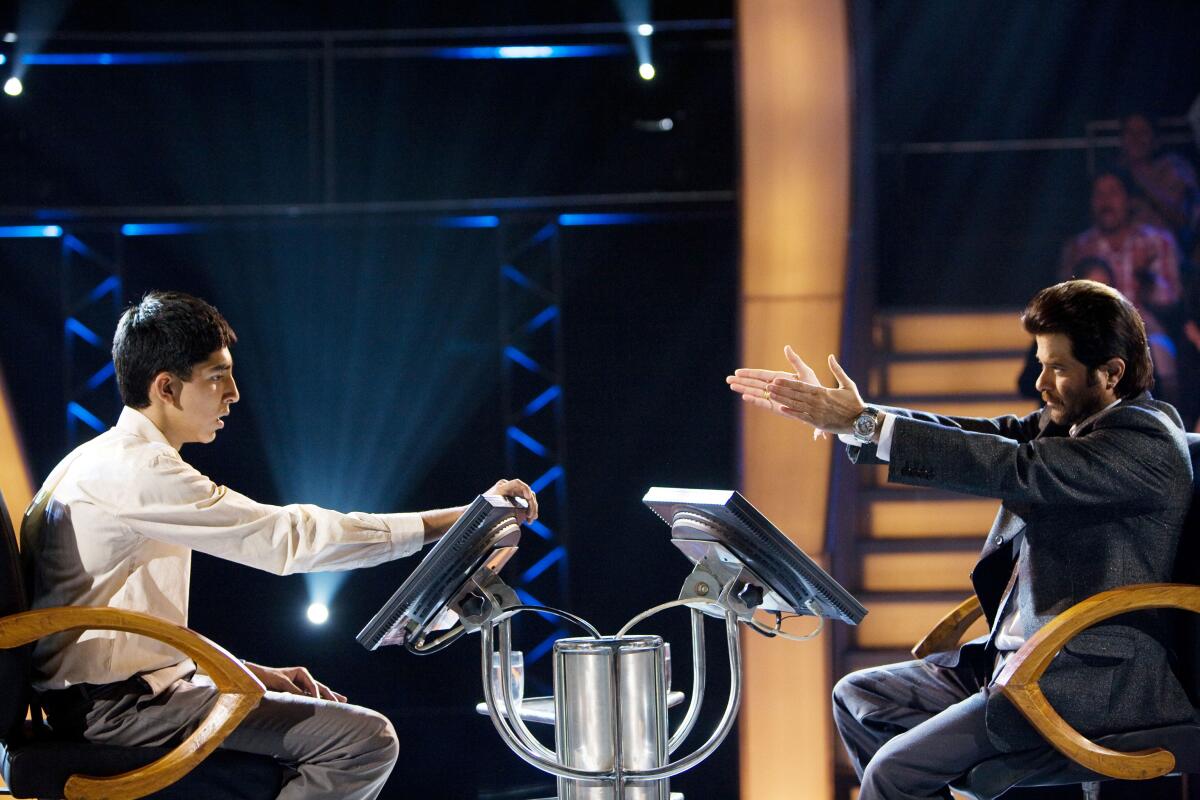
81st Academy Awards — February 2009
Rated: R, for some violence, disturbing images and language.
Running time: 2 hours
Streaming: Prime Video: Included | Apple TV+: Rent/Buy
I’m not just recommending that you see “Slumdog Millionaire” but rather offering up some suggestions on how to see it. What I’d ask you to do is forget — everything. Forget “Slumdog’s” 10 Oscar nominations, toss aside any latent memories of the 60-odd awards it has already piled into its trophy case, look past the crushing embrace of the nation’s film critics, step over the backlash from those who saw it after a tidal wave of hype had raised expectations to tsunami heights, withdraw every random “Slumdog” comment from your memory bank. Now you’re almost ready. Approach it with no expectations, no opinions, no reservations, no resistance and no popcorn. Not even a kernel. Breathe. Let your mind go blank. Breathe again. Then give yourself over to a story that will transport you to another place if you let it, one filled with all the elements, bad and good, that come with any complex world. (Read more) —Betsy Sharkey
2009: ‘The Hurt Locker’
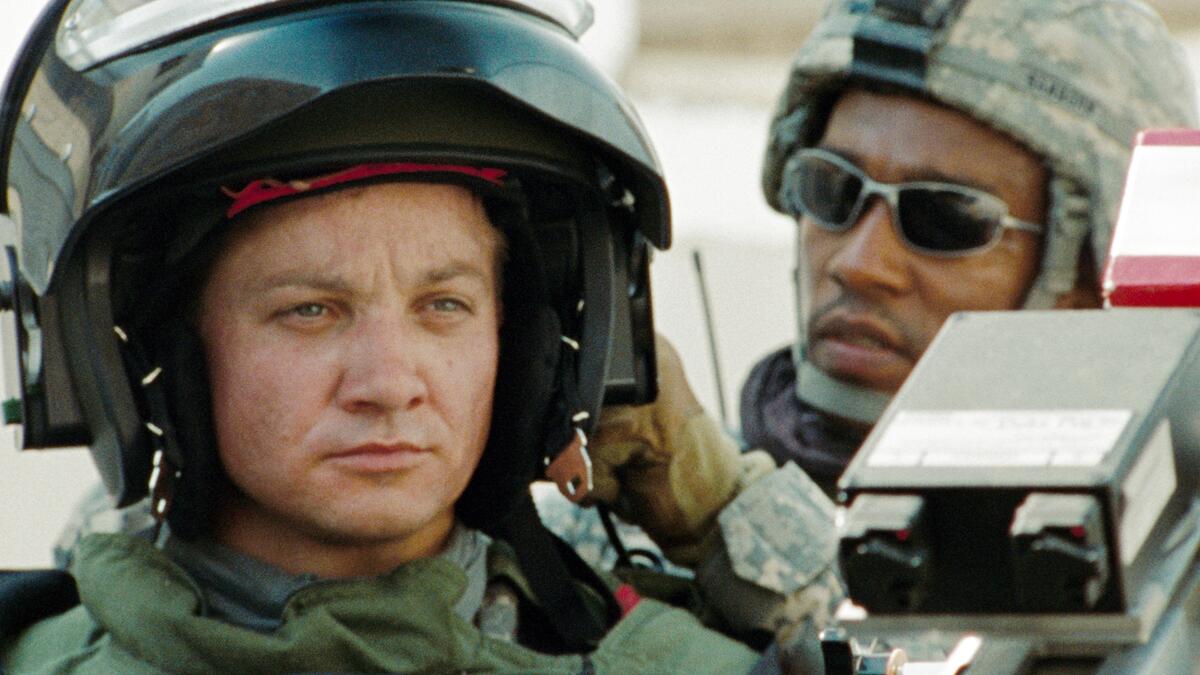
82nd Academy Awards — March 2010
Rated: R, for war violence and language.
Running time: 2 hours, 7 minutes
Streaming: Netflix: Included | Prime Video: Rent/Buy | Apple TV+: Rent/Buy
“The Hurt Locker” has the killer impact of the explosive devices that are the heart of its plot: It simply blows you apart and doesn’t bother putting you back together again. Overwhelmingly tense, overflowing with crackling verisimilitude, it’s both the film about the war in Iraq that we’ve been waiting for and the kind of unqualified triumph that’s been long expected from director Kathryn Bigelow.
Bigelow has been on critics’ watch lists since her hallucinatory early films “The Loveless” and “Near Dark.” But until now she’s never had a subject that so successfully utilized her gift for stylized suspense and what she calls “heightened emotional states” as this tale of a three-man U.S. Army bomb squad (tautly portrayed by Jeremy Renner, Anthony Mackie and Brian Geraghty) deployed in the terrifying streets of Baghdad.
Actually, it’s unfair to burden “The Hurt Locker” with the Iraq label. It’s more of a classic study of men in combat and under stress that could have taken place almost anytime, anywhere. (Read more) — Kenneth Turan
How to watch Oscar Best Picture winners through the decades
Intro and 1920s | 1930s | 1940s | 1950s | 1960s | 1970s | 1980s | 1990s | 2000s | 2010s | 2020s (and 2020 nominees)
More to Read
Only good movies
Get the Indie Focus newsletter, Mark Olsen's weekly guide to the world of cinema.
You may occasionally receive promotional content from the Los Angeles Times.
